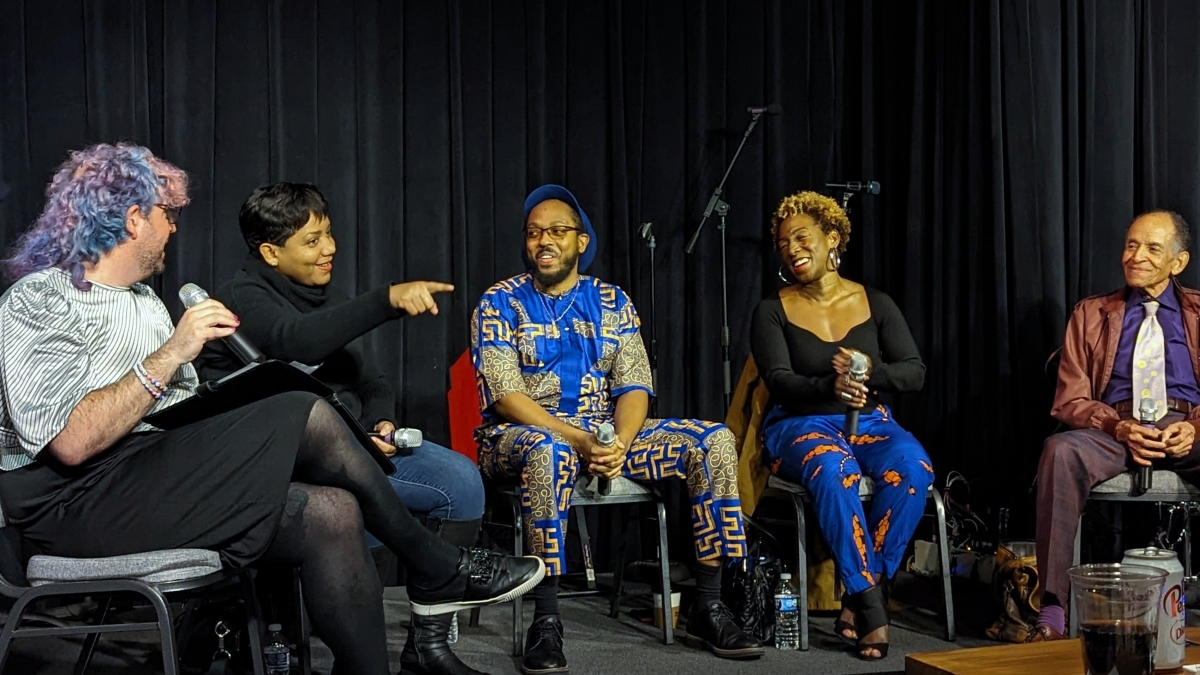ASU jazz experts discuss music, life and learning at downtown venue

Faculty from ASU's School of Music, Dance and Theatre gathered during Black History Month to discuss music, life and learning at The Nash jazz club and educational space in downtown Phoenix. From left: ASU faculty Christie Jay Wells, Joyce McCall, Corcoran Holt, LaTasha Barnes and musician Charles Lewis. Photo by Benjamin Adelberg
Jazz is more than a style of music, notes or dance steps. It’s a way of living and learning, a history that has been passed down for generations — and a touchstone of many Black communities.
“You can’t separate the Black experience from the music,” said Joyce McCall, an assistant professor at Arizona State University's School of Music, Dance and Theatre.
McCall is one of several jazz tradition-bearers on the school's faculty, some of whom recently gathered during Black History Month to celebrate the genre at The Nash jazz club and educational space in downtown Phoenix.
Fellow School of Music, Dance and Theatre Assistant Professors LaTasha Barnes and Corcoran Holt joined McCall for the panel discussion, moderated by Christi Jay Wells, an associate professor of musicology and a Race, Arts and Democracy Fellow with ASU’s Center for the Study of Race and Democracy.
Joining the panel was Herb Ely, one of the founders of The NashThe Nash is named for internationally acclaimed drummer Lewis Nash, who is a professor of practice in the ASU School of Music, Dance and Theatre. Called “one of the great jazz venues in the world” by Downbeat Magazine, it has been a center for jazz and jazz education since 2012. , and 91-year-old Charles Lewis, an Arizona Music and Entertainment Hall of Fame inductee who attended ASU more than 70 years ago as a dance major.
“It wasn’t until 1953 that I began to appreciate classical music because I got involved with dancers at ASU (with) Margaret Gisolo,” Lewis said of the woman who founded the ASU College of Fine Arts dance department in the 1950s.
The panel members showcased their collaboration and improvisation abilities as they riffed about their upbringings and introductions to jazz, each story like a new instrument and perspective.
“I didn’t know I was born into a family of dancers and music lovers, but my soul did,” Barnes said. “I was being swung out by a friend of mine who was teaching authentic jazz, and my body remembered my great-grandmother swinging me out in the living room at age 4.”
A multi-Bessie Award winner, Barnes is an internationally awarded and celebrated dance artist and educator. Her award-winning show “The Jazz Continuum” showcases jazz as more than just a genre. It highlights the collaborative culture of jazz with lessons and approaches on how to see the world.
As people add to jazz’s definition, McCall said, they need to be taught its story and pass it down properlyThe professors teach what Wells calls an “intergenerational transfer” of jazz. to the next generation. Her research centers on how race, class and culture impact educational equity in music learning and teaching. She hopes to instill in her students that music is a story, and tells them to show her the music in their bodies.
“I can’t tell you how many times I’ve gone to jazz conferences and the kids blow the notes off the page and are amazing, but what about the story?” she said. “What about the style?”
Holt, who fell in love with jazz after hearing Reggie Workman play live, recalled the time a student asked how to play a ballad. “First, you need to get your heart broken,” Holt told him.
Anyone can talk theory in a classroom or play a John Coltrane solo note for note, but it’s not going to sound like John Coltrane, Holt explained. An award-winning musician, Holt served as a jazz ambassador for the United States and has worked as an educator and clinician with Jazz at Lincoln Center since 2010. Holt also leads his own ensembles.
“Music is not just about what happens in the classroom; it is your life,” he said.
As the discussion came to an end, Holt joined Lewis and his quartet for a performance. As music filled the room, it was apparent that these experts will continue to joyfully carry forward the tradition of jazz — in their classrooms, on the stage, in conversations and in jam sessions — to the next generation.
More Arts, humanities and education

Professor's acoustic research repurposed into relaxing listening sessions for all
Garth Paine, an expert in acoustic ecology, has spent years traveling the world to collect specialized audio recordings.He’s been to Costa Rica and to Ecuador as part of his research into innovative…

Filmmaker Spike Lee’s storytelling skills captivate audience at ASU event
Legendary filmmaker Spike Lee was this year’s distinguished speaker for the Delivering Democracy 2025 dialogue — a free event organized by Arizona State University’s Center for the Study of…

Grammy-winning producer Timbaland to headline ASU music industry conference
The Arizona State University Popular Music program’s Music Industry Career Conference is set to provide students with exposure to exciting career opportunities, music professionals and industry…

